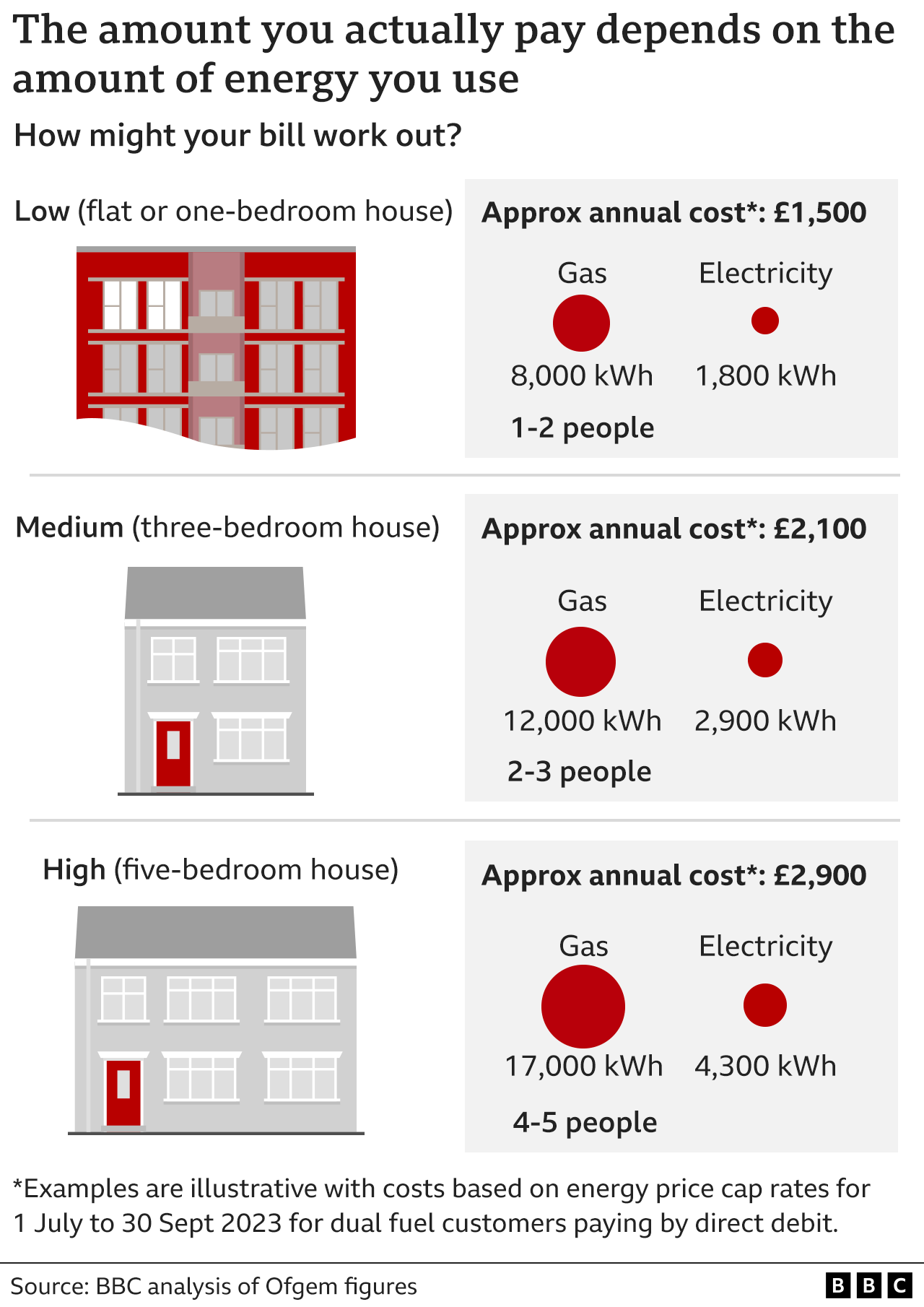Domestic gas and electricity bills have decreased due to a change in the energy price cap, and another, smaller decrease is anticipated this winter.
With a typical amount of energy use, an English, Welsh, or Scottish household will now pay £2,074 annually, a reduction of £426.
The typical bill could drop to £2,000 per year this winter, according to analysts at the consultancy Cornwall Insight.
That, however, is still very much higher than the pre-pandemic average.
Despite falling prices, charities and vendors have issued warnings that many consumers with tight budgets may still find it difficult to make ends meet.
Depending on how much gas and electricity a household uses, the actual cost will vary.
The "first act" of the energy crisis was over, according to Centrica's chief executive Chris O'Shea on Friday, but risks persisted. Centrica is owned by British Gas.
Companies have added hundreds of additional employees, according to Energy UK, which represents suppliers, to ensure that support is available.
Bills can no longer be paid with government assistance, which in recent months only allowed for a £2,500 cap. Although cost-of-living payments will continue to be given to those on low incomes and receiving certain benefits, there are no plans to reinstate the £400 discount on all bills that the government funded last winter.
Over the past 18 months, customers have paid high prices for energy at the wholesale level, which has led to high consumer prices.
Regardless of government intervention, the energy regulator Ofgem establishes a cap on the price suppliers can charge customers for each unit of gas and electricity. In Scotland, Wales, and England, it applies to households with variable or default tariffs.
The new cap's electricity unit rate is 30p per kWh, with a standing charge of 53p per day. It goes into effect on Saturday and lasts for three months. The cost of a gas unit is 8 pence per kWh, and a daily standing charge is 29 pence.
The calculations are based on a direct debit customer using 12,000 kWh (kilowatt hours) of gas and 2,900 kWh (kilowatt hours) of electricity annually. The energy unit used to determine your bill is the kilowatt hour.

Despite falling prices, not everyone will immediately notice a change in their direct debits.
Suppliers must make sure the payments, which are spread out over the course of the year, are based on accurate and current information, according to Energy UK.
Some customers' amounts may have already been assessed because suppliers work on different schedules for doing so. Customers can rest assured that their direct debit will be updated by their supplier, and they will be contacted directly, according to an Energy UK spokeswoman.
To ensure the accuracy of their direct debit calculations, customers are encouraged to submit meter readings.
The cap change will affect about 29 million households, but there are some differences in the usual payments. They comprise:.
Vouchers as part of the government's support program were available to those who qualified but did not use them.
The vouchers, which were given to individuals who did not qualify for the £400 government discount taken off their bill last winter, are no longer valid. They include those who use certain prepayment meters. There were unclaimed millions of pounds.
According to charities, people's ability to pay their energy bills is still a source of concern. There is an "urgent case" for government assistance for the 6.6 million UK households that will still be living in fuel poverty, according to National Energy Action, a group that advocates for warm, dry homes.
The charity's chief executive, Adam Scorer, stated that too many people would continue to accumulate unmanageable debts or try to survive in unheated homes, which would lead to ill health, misery, and avoidable deaths. .
A spokesperson for Ofgem stated: "This continues to be one of the most challenging and unstable times for energy consumers in history. And although people will see lower bills, they will still be higher than they were before the energy crisis. ".
Environmental scientist Angela Terry, who founded One Home, a social enterprise that offers eco-friendly, cost-effective advice, has provided the following energy-saving suggestions:.
- Use showers instead of baths by receiving a free water-saving shower head from your water provider.
- Consider loft insulation, which she claims can reduce your annual gas costs by £355 and costs about £460 for a typical semi-detached home.
- When possible, drive less by walking instead of using a dryer, and hang out your laundry.
- On windy days, use your senses to locate drafts in the house. To find them, wet the back of your hand, and then use insulation or draught-proofing tape.
- To flush the toilet with less water, press the smaller button when it's available.
What can I do if my energy bill is unpayable?







